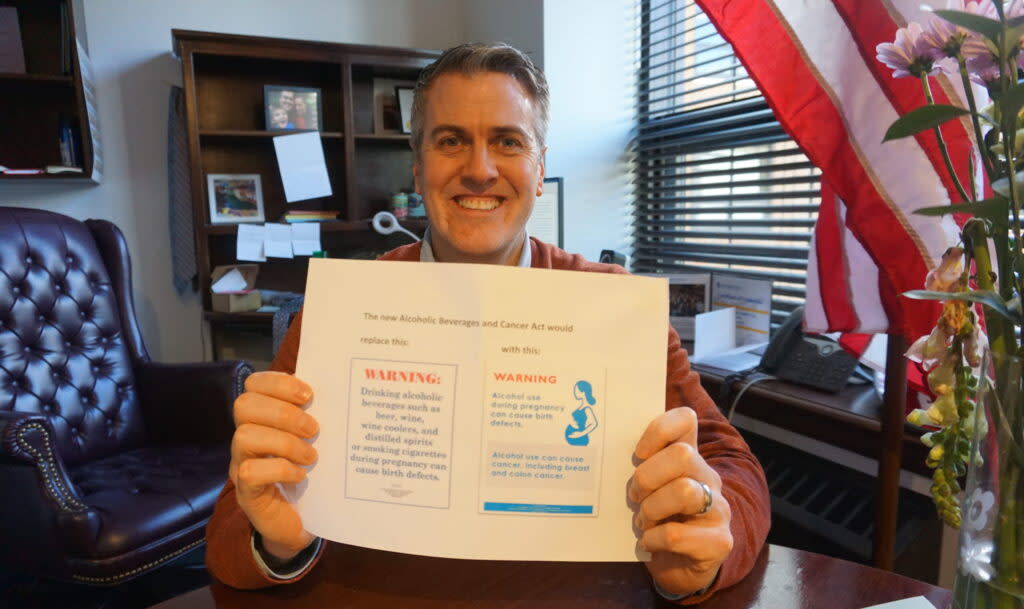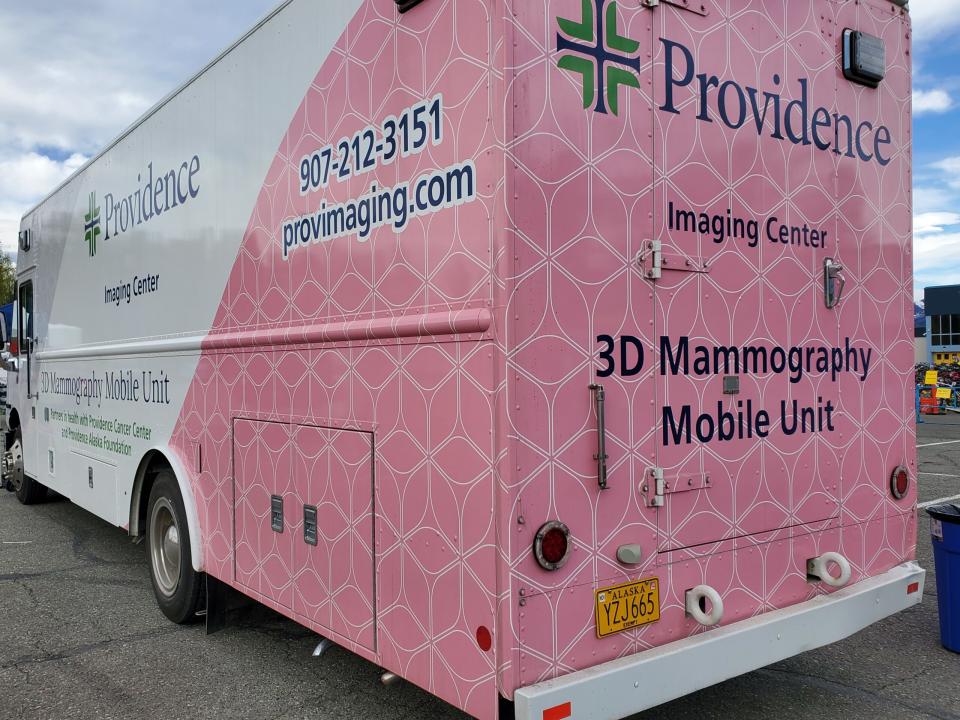Alaska Legislature passes cancer-related bills as amendments to other legislation

Rep. Andrew Gray, D-Anchorage, in his capitol office on Thursday, holds up a printout showing how warning signs about alcohol consumption's health effects would change under legislation he sponsored. Gray's legislation was folded into another bill that passed and, if signed by the governor, would allow workers younger than 21 to serve alcoholic beverages. (Photo by Yereth Rosen/Alaska Beacon)
Alaska bar patrons will see new signs warning about the link between alcohol and cancer, and women at elevated risk for breast cancer will no longer have to pay extra money for more detailed examinations that go beyond routine mammograms, if bills passed by the Legislature are signed by the governor.
Both measures were proposed initially in stand-alone legislation but wound up combined with related bills that passed late in the session.
The proposal for signs warning about the alcohol-cancer link was originally in a bill sponsored by Rep. Andrew Gray, D-Anchorage. It was later bundled with a different alcohol-related measure, House Bill 189, that would allow workers between the ages of 18 and 21 to serve alcohol.
That underlying bill, sponsored by Rep. Jesse Sumner, R-Wasilla, was seen as important to restaurants and other businesses coping with a labor shortage.
Gray, a physician assistant, introduced his bill to raise public awareness about how alcohol consumption increases cancer risks. While surveys show that public awareness of the connection is low, cancer experts say alcohol consumption ranks near the top of modifiable cancer-causing behaviors and conditions, along with the better-known factors of tobacco use and obesity.
Legislative approval of the alcohol-cancer signs was won narrowly.
Gray’s legislation was crafted so that only one new sign would be required at each establishment, thus minimizing the cost to the state and keeping it below the threshold that would require consideration by the House Finance Committee.
The design for the new signs was also crafted carefully, with a word count kept low and a graphic of a pregnant woman incorporated to make clear a combined message about health risks of alcohol consumption.
“We made sure that we did not increase the word count. And we also wanted to make it more readable,” Gray said. “In general, I just think that we’ve created a more meaningful, impactful sign that will have the effect of educating the public and potentially changing their choice as far as alcohol consumption.”
The design was borrowed from a prototype considered in Georgia, where that state’s Legislature weighed but declined to pass a similar bill, Gray said.
The House passed the amendment inserting it into Sumner’s underlying bill on May 6 by the narrowest of margins, 21-19, with the support of Sumner and a few other majority-caucus members. Final passage of the bill came with a House concurrence vote cast three minutes after midnight on Wednesday, considered the deadline for the legislative session.
Sumner’s bill was important to the business community, Gray said, even if that community “may not have been very amenable to my bill,” which might cause people to buy less alcohol.
“In a way, this was probably the only vehicle to get this legislation across the finish line,” he said.
Gray, on the day after the session ended, praised and thanked Sumner.
“There are certain brave people who are willing to think for themselves, regardless of how the party may view their actions. So I think Jesse Sumner is a conservative politician, but he is absolutely willing to be independent from the party. And that’s what I needed. Because this is not partisan policy; this is just good health policy,” he said. Cancer, he added, “doesn’t care if you’re Republican or Democrat. I think most folks want to prevent cancer.”
The Alaska bill has gotten some national attention.

“We applaud the Alaska state legislature for seeking to enable consumers to make more informed choices around alcohol,” Thomas Gremillion, director of food policy at the nonprofit Consumer Federation of America, said in a statement. “Alcohol-attributable cancers kill tens of thousands of Americans each year. The available evidence makes clear that most consumers fail to appreciate that risk. Policymakers in other states, and at the federal level, should follow Alaska’s lead in warning consumers about alcohol cancer risk.”
Only a few jurisdictions have required signs warning about the links between alcohol and cancer. In Ireland, for example, warning labels will be required on alcohol products starting in 2026. In Canada’s Yukon Territory, an administrative policy launched in 2017 required such warning labels on alcoholic products, but that requirement was suspended within months.
California for decades has had a requiment for warning signs about cancer risks of various chemicals and substances, and alcoholic beverages are on the list.
Preventing copayment charges for detailed breast exams
As with the alcohol-cancer signage proposal, there had been a standalone bill concerning diagnostic breast examinations.
That measure, House Bill 285, was introduced by Rep. Zack Fields, D-Anchorage, after he and others were contacted about the issue by the Susan G. Komen Foundation.
As introduced by Fields, the bill aimed to bar private insurers from requiring patients to chip in for the costs for diagnostic mammograms, which are often required after routine mammograms show trouble spots, or other advanced examination technology such as magnetic resonance imaging, known as MRI, or ultrasounds. It is estimated that 15% of women are at high enough risk for breast cancer that they need the more advanced screenings, Fields said. Ultrasounds are also sometimes used to detect breast cancer in men.
That bill wound up being folded into a different health-insurance measure, Senate Bill 134, that concerned insurance data privacy.
While routine mammograms are fully covered by insurers, a requirement under the Affordable Care Act, the more detailed diagnostic examinations can be costly to patients. Often, the costs of copayment for such screening can be seen as prohibitive, discouraging many patients from getting them, according to Fields.
A study published in 2019 by the Susan G. Komen Foundation found that nationally, the median out-of-pocket costs range from $234 for a diagnostic breast mammogram to more than $1,000 for an MRI.
Fields said he became worried about House Bill 285’s chances when it was grouped with a long list of other bills being considered by the House Rules Committee.
“I just thought, the odds that this bill goes to the floor as a standalone are low,” he said. “My take was, lots of really good standalone bills die only because of time, and I was not going to let that happen.”
He learned that Sen. James Kaufman, R-Anchorage, had introduced the insurance bill, he said. Kaufman and Sen. Matt Claman, D-Anchorage, who chairs the Senate Judiciary Committee, “worked really hard to roll it in there to ensure that we had two vehicles close to the finish line, because you never know which one is going to be first,” Fields said.
As it turns out, Fields may not have needed to combine his bill with another. His standalone bill was passed out of the House Rules Committee and sent to the floor, where the House passed it on April 26 by a 37-1 vote.
“Now, I was wrong in a good way,” Fields said on Thursday, the morning after adjournment. However, “You don’t want to let your bill sit, sit, sit in Rules.”
With passage of Senate Bill 134, Alaska joins the majority of U.S. states that have enacted or are considering legislation barring private insurers from charging copayment fees for diagnostic breast examinations.
Similar national measures are pending in Congress that would affect federally managed insurers, which the states’ legislation does not. There are bills in both the U.S. House and U.S. Senate that would bar those insurers from requiring such copayments.
GET THE MORNING HEADLINES DELIVERED TO YOUR INBOX
The post Alaska Legislature passes cancer-related bills as amendments to other legislation appeared first on Alaska Beacon.

